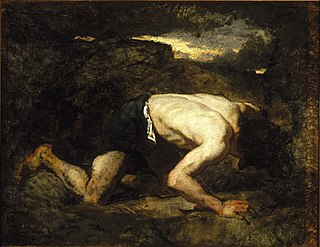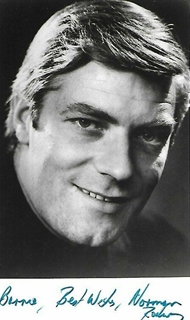
Apemantus is a character in the play Timon of Athens by William Shakespeare. He is a cynical and misanthropic philosopher.

Apemantus is a character in the play Timon of Athens by William Shakespeare. He is a cynical and misanthropic philosopher.
Early in the play, when Timon is wealthy, Apemantus attends Timon's banquet in order to insult him and his guests. He is the only character at the time who treats Timon badly. The rest of the city highly respects him for his wealth and generosity. Apemantus has several witty exchanges with Timon, in which he argues that mankind is untrustworthy and that they are merely Timon's friends because of his money. Timon eventually loses all of his money and is abandoned by his friends. He turns his back on Athens to live in a cave, and takes the same opinions about mankind which Apemantus had. Apemantus visits him to accuse Timon of copying his ideals. The two of them then proceed to elaborately insult each other.
The best known recent Apemantus was portrayed by the Irish actor Norman Rodway, who played the role both for BBC television and for The Arkangel Shakespeare audiobook. His performance in these differ significantly, as neither the rest of the cast nor the interpretation is the same.

Diogenes, also known as Diogenes the Cynic or Diogenes of Sinope, was a Greek philosopher and one of the founders of Cynicism. He was born in Sinope, an Ionian colony on the Black Sea coast of Anatolia in 412 or 404 BC and died at Corinth in 323 BC.

Robert Armin was an English actor, and member of the Lord Chamberlain's Men. He became the leading comedy actor with the troupe associated with William Shakespeare following the departure of Will Kempe around 1600. Also a popular comic author, he wrote a comedy, The History of the Two Maids of More-clacke, as well as Foole upon Foole, A Nest of Ninnies (1608) and The Italian Taylor and his Boy.

Timon of Athens is a play written by William Shakespeare and probably also Thomas Middleton in about 1606. It was published in the First Folio in 1623. Timon lavishes his wealth on parasitic companions until he is poor and rejected by them. He rejects mankind and goes to live in a cave.
Timon is a masculine given name and a surname which may refer to:

The Lion King 1½ is a 2004 American animated direct-to-video musical comedy film produced by the Australian branch of Disneytoon Studios and released direct to video on February 10, 2004. The third and final installment released in the original Lion King trilogy, it is based on The Lion King's Timon & Pumbaa and serves as an origin story for the meerkat/warthog duo Timon and Pumbaa while the film is also set within the events of The Lion King. A majority of the original voice cast from the first film returns to reprise their roles, including Nathan Lane and Ernie Sabella as the voices of Timon and Pumbaa, respectively. The plot of the movie seems to be inspired by Tom Stoppard's Rosencrantz and Guildenstern Are Dead, a tragicomedy that tells the story of Hamlet from the point of view of 2 minor characters.

A "yo mama" joke is a reference to a person's mother through the use of phrases such as "your mother" or other regional variants, frequently used to insult the target by way of their mother. Used as an insult, "your mother..." preys on widespread sentiments of parental respect, making the insult particularly and globally offensive. "Your mother" can be combined with most types of insults, although suggestions of promiscuity are particularly common. Insults based on obesity, height, hairiness, laziness, incest, age, race, poverty, poor hygiene, unattractiveness, homosexuality, or stupidity may also be used. Compared to other types of insults, "your mother" insults are especially likely to incite violence. Slang variants such as "yo mama", "yo momma", "yer ma", "yer mum", "ya mum", "ya mom", "ur mom", "your mum", "ur mum", "ur mother", "Joe mama", or "your mom" are sometimes used, depending on the local dialect. Insults involving "your mother" are commonly used when playing the Dozens.
Philostrate is a fictional character in a number of literary works, including William Shakespeare's A Midsummer Night's Dream (1596). In that play, he is the Master of the Revels at Theseus' court, meaning he is in charge of his lord's entertainments, making recommendations to Theseus, as well as altering the text of some of the plays performed in his court. Shakespeare may have used this character to poke fun at play censorship in London at the time. In early performances of the play, the actor who played this character probably also played the part of Egeus, Hermia's strict father. There is only one scene in act V where both Egeus and Philostrate are present, and in this scene Egeus' character would have taken all of Philostrate's lines as his own.

Brian Bedford was an English actor. He appeared in film and on stage, and was an actor-director of Shakespeare productions. Bedford was nominated for seven Tony Awards for his theatrical work.

Timon and Pumbaa are an animated meerkat and warthog duo introduced in Disney's 1994 animated film The Lion King and its franchise. Timon was played through his many appearances by Nathan Lane, Max Casella, Kevin Schon, Quinton Flynn, Bruce Lanoil in the Wild About Safety shorts and Kingdom Hearts II, while Pumbaa is voiced by Ernie Sabella, and was portrayed by Tom Alan Robbins in the original cast of the Broadway musical. In the CGI remake, the characters are portrayed by Billy Eichner and Seth Rogen, respectively. Nathan Lane and Ernie Sabella first came to audition for the roles of the hyenas, but when the producers saw how well they worked together, they decided to cast them as Timon and Pumbaa.
A ghost character, in the bibliographic or scholarly study of texts of dramatic literature, is a term for an inadvertent error committed by the playwright in the act of writing. It is a character who is mentioned as appearing on stage, but who does not do anything, and who seems to have no purpose. As Kristian Smidt put it, they are characters that are "introduced in stage directions or briefly mentioned in dialogue who have no speaking parts and do not otherwise manifest their presence". It is generally interpreted as an author's mistake, indicative of an unresolved revision to the text. If the character was intended to appear and say nothing, it is assumed this would be made clear in the playscript.

Timon of Athens was a citizen of Athens whose reputation for misanthropy grew to legendary status. According to the historian Plutarch, Timon lived during the era of the Peloponnesian War.

Norman John Frank Rodway was an Anglo-Irish actor.

Frank Cellier was an English actor. Early in his career, from 1903 to 1920, he toured in Britain, Germany, the West Indies, America and South Africa. In the 1920s, he became known in the West End for Shakespearean character roles, among others, and also directed some plays in which he acted. He continued to act on stage until 1946. During the 1930s and 1940s, he also appeared in more than three dozen films.
Timon is a 1973 Yugoslavian film directed by Tomislav Radić. It is based on William Shakespeare's tragedy Timon of Athens.
The History of Timon of Athens the Man-hater by Thomas Shadwell is a 1678 adaptation of Timon of Athens, the play by William Shakespeare.
John Evans (1693?–1734?), was an actor, who confined his performances to Ireland.

Shylock is a fictional character in William Shakespeare's play The Merchant of Venice. A Venetian Jewish moneylender, Shylock is the play's principal antagonist. His defeat and conversion to Christianity form the climax of the story.